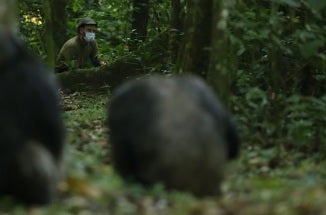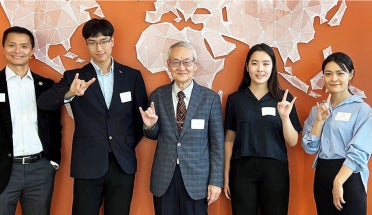
Professor Partners with Ugandan University for Primate Conservation
- Oct 29, 2024
- Global Initiatives
- by Sophia Baca
Streams of light poke through the thick canopy of the rainforest in Uganda. Several chimpanzees sit on the forest floor — two adults grooming each other, and a small juvenile playfully wrestling with a young adolescent. They wheeze and pant in what even the strictest scientist might call laughter.
To the average person, these creatures might seem like wild, unpredictable animals. But to the primatologist watching intently nearby, half obstructed by leaves, these creatures are a psychological phenomenon. He sees friendships, complex emotions, bonds strengthening and breaking right before his eyes.
Aaron Sandel is that primatologist. An associate professor and biological anthropologist in the College of Liberal Arts’ Department of Anthropology at The University of Texas at Austin, he has earned not only a Global Virtual Exchange (GVE) grant but also a Faculty Research Seed Grant from Texas Global for his ongoing work in Uganda on the study of chimpanzees and their psychological behavior.

As an undergraduate, Sandel studied biological and evolutionary anthropology, which is where he developed the interest in chimpanzee behavior that guides his current research. His research focuses on studying chimpanzees’ social bonds and communities from both psychological and physiological perspectives.
“Chimpanzees are some of our closest relatives,” explained Sandel, “and in all these dark but also really beautiful ways, they're really similar behaviorally to humans.”
Teaching Coexistence
The GVE grant supports UT Austin faculty in partnering with peers at universities around the world to co-develop and co-teach courses in which students collaborate and learn together using online tools. Sandel received the GVE grant for his class, Primate Conservation, the Human Story of Ecosystems in Uganda.
Sandel collaborated with two Ugandan political ecologists, professors David Tumusiime at Makerere University in Kampala, Uganda, and Moses Muhumuza at Mountains of the Moon University in Fort Portal, Uganda. They co-created a GVE course that aimed to educate students on how to protect primates and the ecosystems in which they live while simultaneously considering the needs of nearby human communities.
“It was an opportunity for me to learn more about these really complex issues that relate to humans and our place in the environment,” said Sandel of the collaboration.
Nearly 25 students from UT and Makerere joined Sandel’s class weekly via Zoom and WhatsApp. While it took some time to work out some kinks in time zone differences and internet access, the undeniable outcome was enthusiasm and commitment from the students.
One of these students was Blessing Apamaku, who is now a current Ph.D. scholar at UT under the mentorship of Dr. Sandel. Apamaku, from the course’s Ugandan cohort, was among three GVE students who subsequently interned with Sandel in Uganda.

There, the team researched primate ethology and endocrinology through a combination of field and lab work. Later, at a 2024 conservation conference in Rwanda that focused on inclusivity in biodiversity, these students shared perspectives about their experiences working in international collaborative research.
“Working with Dr. Sandel and participating in the GVE program was an enriching experience for me,” said Apamaku. “It offered a valuable platform for connecting with peers and field experts, exchanging ideas and gaining new perspectives.”
Apamaku credits her experience in the GVE program with helping establish her current goals in primatology.
“The collaborative environment deepened my appreciation for interdisciplinary approaches to primate conservation,” said Apamaku. “This experience has solidified my commitment to advancing primate research and conservation efforts.”
Combating Scientific Exclusivity
Sandel’s work in Uganda goes far beyond research on chimpanzee behavior, however. Another of his main goals is to bring awareness to the phenomenon of “parachute science” and offer methods for its prevention within the higher academic community.
Parachute science, as explained by Sandel, occurs when scientists — typically from the United States or Western Europe — travel to other countries to conduct research, then immediately depart after obtaining the data they need. This proves problematic when researchers neither invite their local colleagues to participate nor share findings with them afterward.
“It's a little extractive and exploitative,” said Sandel of the practice, but the GVE program’s commitment to collaborating with international universities helps create connections with faculty and students in these countries in order to introduce a more interdependent process to international research.
“By increasing collaborations with students, scientists, professors and all community members in the country and community where we're working, Texas Global programs have really enabled me to strengthen those relationships,” said Sandel.
Sandel sees the community members who live near Kibale National Park, where he works, as key stakeholders. The research being conducted there has a direct effect on them and others who live there. These stakeholders should be informed and included in the research process, Sandel believes, and their needs and issues should be prioritized, even if not directly related to the research.
“That's sort of the basic way one should do business,” said Sandel. “We should be meeting the needs of stakeholders. We should realize the stakeholders are the people living in that region.”
Research with Stakeholders
To counteract the phenomenon of parachute science, Sandel plans to use his Faculty Research Seed grant to return to Uganda. There, he will work in partnership with Herbert Kasozi, a wildlife biologist at Makerere University, to find strategies for reducing conflicts between wildlife and the human communities at the edges of Ugandan national parks. These conflicts arise when some animals, especially elephants, baboons, and chimpanzees, enter people’s small farms and destroy their crops.

One possible approach to deterring wildlife intrusion builds on insights into chimpanzee behavior: Due to their territorial nature, chimpanzees will often avoid areas they believe are claimed by other family groups. Sandel hypothesizes that one way to keep them out of people’s farms could be to play the vocalizations of stranger chimpanzees. Sandel and Kasozi plan to work with students and community members to brainstorm additional strategies.
Sandel devised this project from conversations with local community members and alumni from his GVE course. Community members outside the national park highlighted the problems they face in losing their crops to wild animals.
“It creates this inequity because those community members who are subsistence farmers are bearing the cost of the national park being there, with very few benefits,” said Sandel. “Whereas these international researchers, including me, are getting all the benefits without the costs.”
Sandel hopes that in the future, through further collaboration with international communities, scientific research can become more inclusive and beneficial for members of countries where research is being conducted.
“It shouldn't be me who’s coming up with the research questions,” concluded Sandel. “If there's research on primates in Uganda, that should be led by Ugandan scientists, and I'd love to collaborate with them.”



